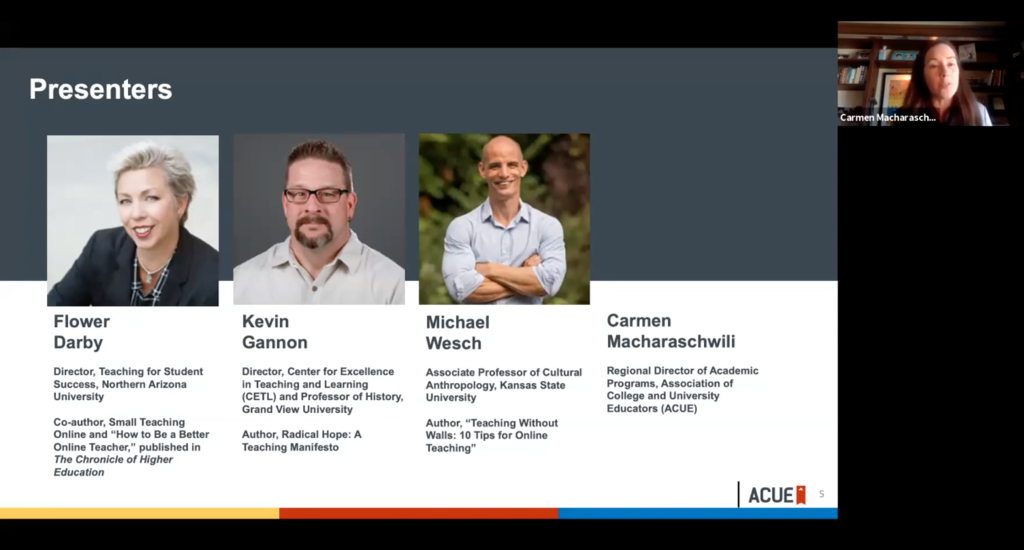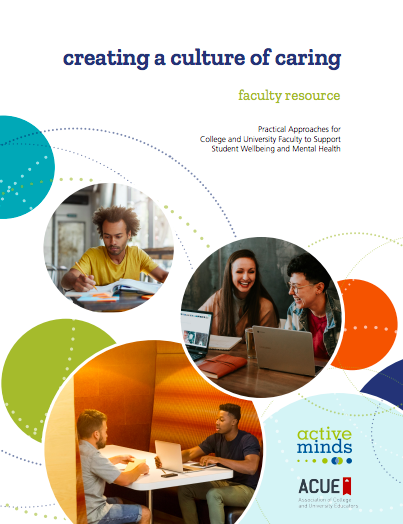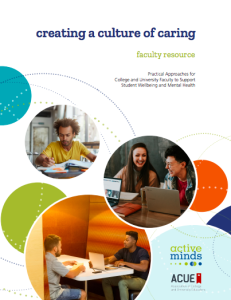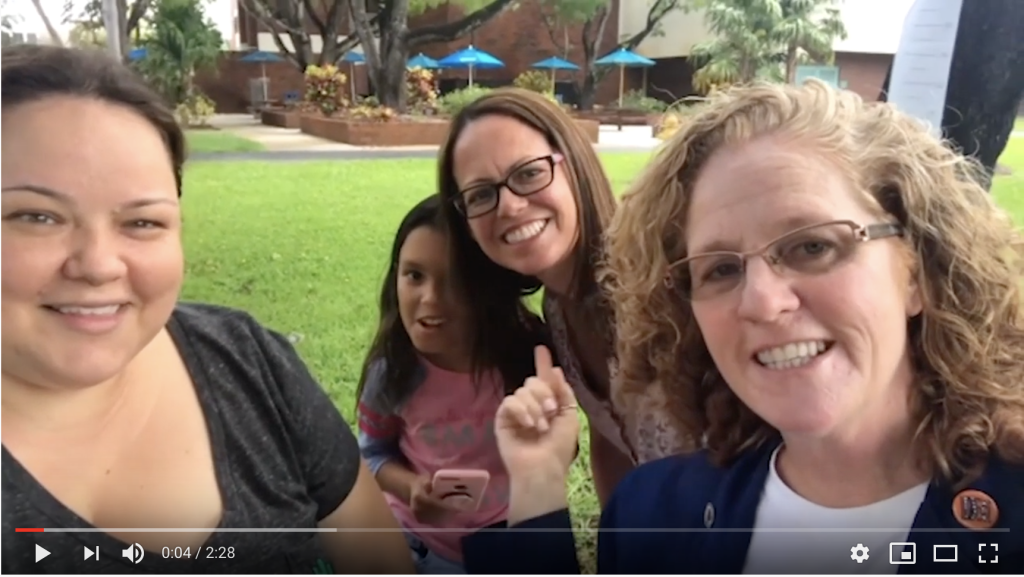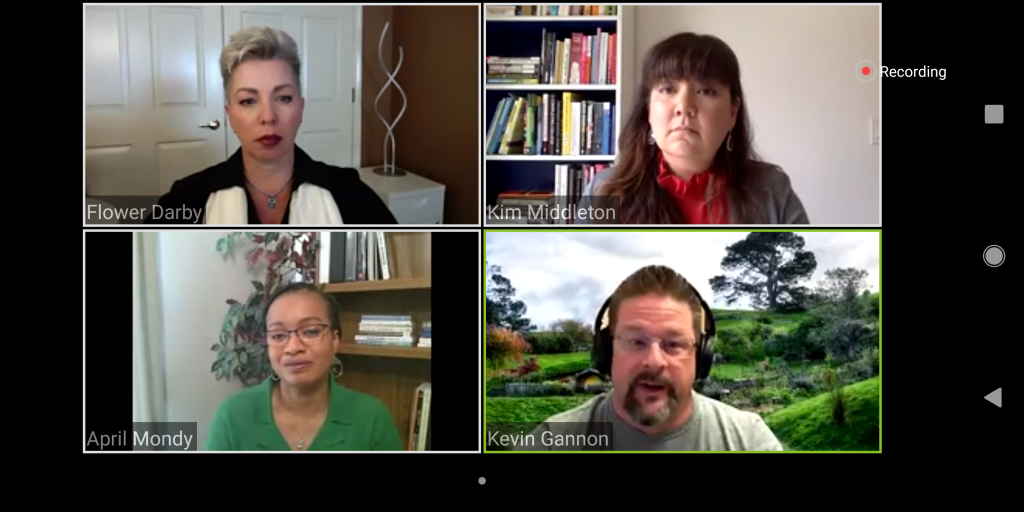
Showing Empathy and Communicating in Survival Mode: Managing Your Online Presence While Teaching During Coronavirus
You, the instructor, play an important role in shaping your students’ learning experience. As courses across the world move online in light of the coronavirus pandemic, prompting discussions and engaging and encouraging students become all the more challenging. How do you support your students and foster learning in a virtual setting?
Northern Arizona University’s Flower Darby, Delta State University’s April E. Mondy, and Grand View University’s Kevin Gannon set out to address this question in Managing Your Online Presence, the second in ACUE’s series of Effective Online Instruction seminars. In partnership with The American Association of State Colleges and Universities (AASCU), The American Council on Education (ACE), The Association of Public and Land-Grant Universities (APLU), The Council of Independent Colleges (CIC), and The National Association of System Heads (NASH), the series addresses a variety of topics to help instructors effectively transition to remove learning environments. This webinar was moderated by Kim Middleton, academic director at ACUE.
Mondy stressed the need for effective communication during these tumultuous times. “We’re in survival mode,” she said. “Communication should be transparent, empathetic, proactive, and consistent.”
She also reminded participants of the importance of flexibility during periods of uncertainty. “We need to be flexible, patient, and understanding with students, and they need to be flexible, patient, and understanding with us.”
To that end, she encouraged faculty to convey understanding and a willingness to work with, not against, their students. This, she said, includes anticipating and proactively addressing questions and concerns from students before they arise. It also means being consistent, such as sending emails and announcements at the same time every week.
Darby, too, pointed to the need for communication. “Emphasize ‘one-to-many’ communication instead of one-to-one,” she said.
She presented the Community of Inquiry framework, noting three presences necessary, including cognitive, social, and teaching. The presences all intersect at deep learning and include such factors supporting discourse, setting climate, and selecting content. “Emotional presence should suffuse the whole thing,” she concluded.
Darby urged faculty to ask students to share challenges they might be experiencing outside of class with them through a survey or other means.
Gannon, too, believes check-ins and surveys can be effective. “It’s important to signal we’re aware that these are weird times for everybody,” he said.
He also proposed creating a “parking lot” to post items that may not come up in class discussions but need to be addressed. Via a discussion board or other channels, instructors can post topics, and students can ask questions. Gannon simply posed the prompt, “Got a question?” to encourage students to chime in.
Creating a low-to-no-stake space, he said, is essential, as is showing transparency and empathy.
During the Q&A portion, participants wondered how the experts might address a situation in which students weren’t willing to cut their instructor some slack.
“Sometimes, students have a tendency to put us on a pedestal,” Mondy said. “They need to be reminded that this is something we’re all dealing with. Say, ‘I’m trying to be flexible with you, and I need you to be flexible with me.’”
“Our students may be communicating less skillfully than they usually would with us,” Gannon added. “Give them the benefit of the doubt.”
“The more we’re willing to be vulnerable and let students into our lives, the more forgiving they’ll be,” Darby suggested.
Other participants asked for suggestions on communicating with students who had limited technology access.
“Don’t compromise the integrity of their learning, but be more flexible at this time,” Mondy said. As an example, she told an anecdote about a student who was unable to complete an assignment because he only had access to a tablet, not a computer.
“Ask yourself, ‘Could I do this on my cell phone?’” Gannon proposed. “That helps you think of ways to create alternate means of completing assignments. Are there ways to limit materials we want them to access?”
“Most students have some kind of smartphone,” Darby said. “Offer ways to communicate, whether it’s one-to-one with you, in a small group, or to the whole class.”
“We need to work through challenges together,” said Mondy.
To ask a question, add your own thoughts, watch the webinar or read a transcript, or access plenty of online teaching and learning resources, visit the Managing Your Online Presence webinar page.

